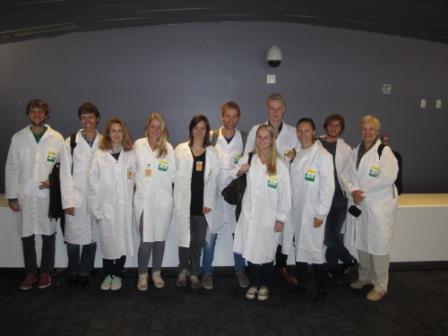Summer School Energy Law in Rio de Janeiro
From 13 - 20 August 2013 the Groningen Centre of Energy Law together with the RUG Honours College organized for the second time a summer school on energy law jointly with the George Washington University Law School and the Fundação Getulio Vargas ( FGV) Law School in Rio de Janeiro. The summer school was hosted by the FGV Law School in Rio de Janeiro and attended by some 20 selected students interested in energy law.
The aims of the summerschool was to organise and joint research and focused on “Comparative Upstream Oil & Gas Law – New Developments”. In addition to lectures and site visists to Shell E&P, Petrobas and the Brazilian energy regulator, the students have been involved in joint and comparative research resulting in joint presentations at the last day of the summerschool.
The research focused on the regulation of ‘new’oil and gas exploration and production activities. The need to secure long term oil and gas supply has led to the development of advanced techniques which carry with them considerable risks. Examples are deep water drilling and shale gas production. The Deep Horizon incident in the Gulf of Mexico in 2010 illustrates the possible negative impacts of deep water drilling. Similarly, the exploration and production of shale gas may also cause severe damage to the environment. Nevertheless, both techniques are considered essential to secure future energy supply.
The research concentrated on the following 6 topics:
- Is there a need for special regulatory regime for the exploration and production (E&P) of shale gas? If so, why and how?
- How should water use, reuse and treatment be dealt with in the context of shale gas exploration and production?
- How should the use of chemicals in hydraulic fracturing operations be regulated, how and when it should be protected as a trade secret?
- Are supervision and control instruments for conventional E&P operations sufficient in the context of more complex operations such as deep water in light of the experiences with the BP Macondo blowout and, if not, how should these regimes be modified to protect worker safety and the environment?
- Environmental impact review can play an important role addressing the potential problems with new and expanded oil and gas E&P. How should environmental review best be carried out both in terms of strategic environmental review and more site-specific review?
- If there is a spill from an offshore oil or gas facility there can be significant impacts on natural resources. What is the most appropriate legislative structure for assuring natural resources rehabilitation and assessing liability for natural resources damages?
Based on the outcome of this research, the students will prepare articles to be published in 2014.

Meer nieuws
-
08 december 2025
Kleurrijke Kopstukken: Bert Röling
